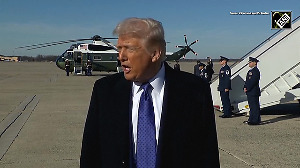A select group of foreign diplomats, escorted by China to riot-torn Lhasa on Saturday, complained of being restrained from talking with the locals. The United States and the European Union also ratcheted pressure on Beijing to open dialogue with the Dalai Lama and respect the rights of Tibetan minorities.
"The delegation was not permitted to move about independently in Lhasa and was unable to hold unsupervised conversations with local residents," the US embassy said in Beijing after the hurriedly-organised two-day trip that included envoys from 15 countries.
Indian diplomats were not invited by the Chinese government, which was apparently unhappy over India's handling of the Tibet issue. China had summoned ambassador Nirupama Rao to the Foreign Office past midnight last week to convey concerns over the storming of its Embassy in New Delhi by a group of Tibetans.
In the tightly scheduled trip two weeks after Lhasa convulsed in the most vicious anti-government protests in two decades, the diplomats attended government meetings, toured the riot-scarred areas and two hospitals and held discussions with individuals.
The diplomats also reportedly visited the Jokhang Temple, where daring monks had disrupted a government-managed foreign media tour on Wednesday, to air grievances against China. Beijing assured visiting diplomats that it would not punish the monks who embarrassed it.
The US raised the issue of free access to Tibet and other areas affected by the unrest for international and domestic journalists, as well as for diplomats, with the Chinese government.
"The officer also urged China to exercise restraint, to engage in dialogue, and to respect the fundamental right of all citizens to peacefully express their religious and political views," the US Embassy said in a statement.
Western powers have been ratcheting up pressure on China to hold dialogue with exiled Tibetan spiritual leader the Dalai Lama but Beijing has struck a tough posture insisting that Tibet is its internal affair.
The US also called on China to respect the "fundamental and universally recognized right of all its citizens to peacefully express their political and religious views without fear of reprisal, whether speaking to journalists and diplomats or participating in peaceful demonstrations".
President George W Bush had called up Chinese President Hu Jintao late last week and voiced concern over the crackdown.
After a meeting between Bush and Australian Prime Minister Kevin Rudd in Washington, both leaders voiced displeasure with Beijing's crackdown on Tibetan protesters and urged China to hold talks with the Dalai Lama.
"It is absolutely clear that there are human rights abuses in Tibet," Rudd, a mandarin-speaking former diplomat in Beijing, said. "It's clear-cut... we need to be upfront and absolutely straight about what's going on."
The European Union has also appealed to China to resolve all issues peacefully, after a meeting of EU foreign ministers in Slovenia on Friday to discuss a possible boycott of the August 8 Beijing Olympic ceremony.
EU Foreign Policy chief Javier Solana said the European Union respects China 's territorial integrity but Tibet 's cultural heritage must also be respected.
However, EU External Relations Commissioner Benita Ferrero-Waldner raised the threat of a boycott over Tibet.
In an interview with a German weekly, Ferrero-Waldner also called on European companies that operate in China to demand respect for human rights and for peaceful demonstrations worldwide.
Opposing a boycott, US Secretary of State Condoleezza Rice on Friday said nothing should be done to insult Chinese people.
"This is a moment of international recognition for the Chinese people, too. And I would hate to do anything that was, in effect, insulting to them -- the people. Not the regime, the people," Rice said.
China has launched a vitriolic attack against the Dalai Lama, accusing him and what it calls his clique, his supporters, of having masterminded the unrest, that has shaken the Communist leadership and brought Beijing under scrutiny at a time when it is preoccupied with the Olympics.
The 72-year Nobel Laureate, living in exile in Dharamsala, has persistently denied China's charges and said he supports the Beijing Olympics, contrary to the oft-repeated allegation that he was trying to sabotage it.
China on Saturday said it would compensate the victims of violence in Lhasa and provide 200,000 Yuan (about US$ 28,170) each to the families of victims. The Tibetan government in exile has put the death toll in the unrest at 140 but the Chinese government insists that it is only 20.






 © 2025
© 2025